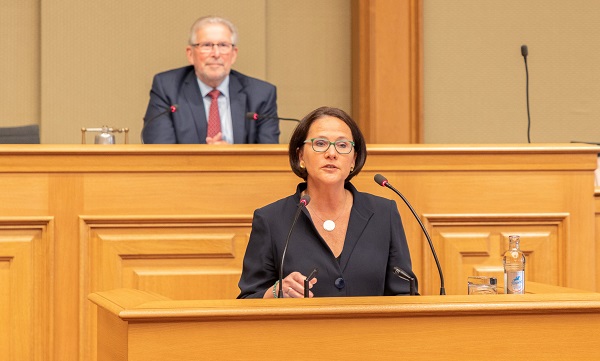 (L-R) Mars Di Bartolomeo, Vice-President of the Chamber of Deputies; Yuriko Backes, Luxembourg’s Minister of Finance;
Credit: Chamber of Deputies
(L-R) Mars Di Bartolomeo, Vice-President of the Chamber of Deputies; Yuriko Backes, Luxembourg’s Minister of Finance;
Credit: Chamber of Deputies
On Tuesday 25 April 2023, Luxembourg’s Minister of Finance, Yuriko Backes, presented the Stability and Growth Programme 2023, which provides an overview of the state of public finances, to the Chamber of Deputies (Luxembourg’s parliament).
Earlier that day, the Minister of Finance and the Minister of the Economy had met the social partners at Senningen Castle to present the main components of the National Reform Programme (NRP) and the Stability and Growth Programme, as part of the European Semester 2023.
Overall, the growth forecasts were encouraging, according to Luxembourg’s Ministry of Finance, but will depend on the evolution of inflation, monetary policy and geopolitical tensions. The consequences of the Russian invasion of Ukraine are still impacting Luxembourg, particularly concerning energy price levels and food prices, which were already elevated before the armed conflict. The situation’s evolution remains unpredictable. However, the Luxembourg economy has shown resilience and has been holding up better than predicted, so far, noted the ministry.
According to the ministry, economic growth stood at 1.5% in 2022, but more optimistic trends have been emerging, particularly due to the downward trend in energy prices. Accordingly, GDP growth is estimated to reach 2.4% in 2023 and 3.8% in 2024. The forecasts are for growth of 2.6% in the medium term, but remain highly dependent on the evolution of inflation, monetary policy and geopolitical tensions. The labour market created approximately 17,000 jobs in 2022, illustrating the growth of domestic employment, which is expected to continue at an average rate of 2.3% over the period 2025-2027.
The measures observed within the framework of the tripartite agreements to tackle inflation have enabled the maintenance of stability, the purchasing power of households and the competitiveness of businesses, according to the ministry. The recorded inflation peaked in 2022 and has showed signs of deceleration. Luxembourg recorded the lowest inflation rate in the European Union in March 2023. STATEC estimated inflation at 2.8% for 2024.
The ministry reported that the update of the budget forecasts made for the 2023 Stability and Growth Programme testified to a generally more positive situation than expected when the 2023 budget was drawn up.
In 2022, Luxembourg's public finances experienced an upturn highlighting the country's resilience in the face of crises, according to the ministry. Public administrations recorded a surplus of €138 million that same year.
The outlook for the current year and subsequent years is more favourable, despite the substantial financial impact linked to the implementation of the latest measures taken to mitigate the impact of inflationary pressures, which will have a significant budgetary effect estimated at €425 million for 2023 and €907 million for 2024.
The general government balance is expected to show a deficit of €1.2 billion (-1.5% of GDP) in 2023. At the central government level, the deficit would amount to €2.4 billion for that same year. The level of deficits forecast for 2023 would, therefore, remain lower than initially forecast in the 2023 budget.
However, the "Solidaritéitspak 3.0" measures are expected to have a significant impact on public finances in 2024. The general government deficit is expected to widen to reach €1.5 billion (-1.7% of GDP) in 2024 before gradually reducing to nearly €890 million (0.9% of GDP) in 2027.
Over the 2023-2027 period, the level of debt is predicted to remain below the threshold of 30% of GDP, in accordance with the government programme.
Minister Backes commented: “The figures of the Stability and Growth Programme underline that the government has made the right choices in the context of the management of the polycrisis. The available budgetary room for manoeuvre has been fully used to strengthen the purchasing power of households, including through a structural reduction in the tax burden, as well as to maintain the competitiveness of our economy, a guarantee of job creation. Thanks to a realistic, united and responsible budgetary policy, Luxembourg can thus face future challenges with serenity.”
Following the parliamentary debates, Luxembourg’s authorities will transmit the Stability and Growth Programme 2023, together with the NRP, to the European Commission








